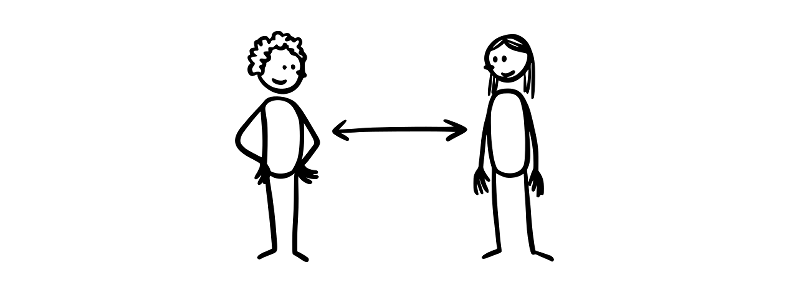Grammar Point:
As you may already know, comparisons in Chinese are typically expressed using 比 bǐ. However, in this article, we’ll explore how to express preferences in Chinese—similar to saying “would rather… than…” in English. Additionally, we’ll introduce three more formal ways to construct comparison sentences in Chinese.
Structure – Showing Preference
与其 + Option A,(S) + 不如 + Option B
This structure is used in Chinese to compare two options and express that one option is better or more preferable than the other. It translates roughly to “Rather than… it’s better to…” in English. You can also add 还 hái, 倒 dào, 真 zhēn before the 不如 bùrú.
與其去爬山,還不如在家看電視与其去爬山,还不如在家看电视
It is better to watch TV at home rather than go hiking.
與其在這裡浪費時間,我們不如認真想想有什麼是我們能做的与其在这里浪费时间,我们不如认真想想有什么是我们能做的
Let’s think about what we can do rather than waste time here.
與其生氣,不如想辦法解決問題与其生气,不如想办法解决问题
Instead of getting angry, it’s better to find a solution.
與其等著別人來幫忙,我們不如自己試著做与其等着别人来帮忙,我们不如自己试着做
Instead of waiting for others to help, we’d better try doing it ourselves.
Common Use Cases:
✓ Making comparisons between two actions, often in terms of practicality or logic.
✓ Giving advice or suggesting a better approach to a problem.
✓ Expressing that one action is more favorable than the other without necessarily indicating personal preference.
与其 + Option A,宁可 + Option B
The grammar structure 与其 yǔqí… 宁可 nìngkě… is used in Chinese to express a preference between two options, often in situations where both options may not be ideal, but one is still preferable. It translates roughly to “rather than… I would prefer…”or “instead of… I would rather…” in English.
Both 宁可 nìngkě and 宁愿 nìngyuàn share the same meaning of “would rather,” but 宁愿 nìngyuàn is slightly more commonly used in spoken language.
與其在這裡修補半天的衣服,我寧可去商場買一件新的与其在这里修补半天的衣服,我宁可去商场买一件新的
Instead of repairing the clothes here for half a day, I would rather go to the mall and buy a new one.
與其跟他同一組,我寧願自已一個人做這份報告与其跟他同一组,我宁愿自已一个人做这份报告
I would rather do this report by myself rather than in the same group with him.
與其跟他結婚,我寧願單身一輩子与其跟他结婚,我宁愿单身一辈子
I prefer to be single for the rest of my life rather than marry him.
與其吃這些不健康的零食,寧可餓著与其吃这些不健康的零食,宁可饿着
Instead of eating these unhealthy snacks, I’d rather go hungry.
Common Use Cases:
✓ Making decisions where neither option is ideal but one is slightly better.
✓ Expressing personal preferences in a somewhat negative or reluctant context.
与其说 + Statement A,不如说 + Statement B
The structure 与其说 yǔqíshuō A,不如说 bùrúshuō B is a way to compare two statements or interpretations in Chinese, suggesting that B is a more accurate or appropriate explanation than A. It can be translated as “Rather than saying A, it’s more accurate to say B.”
與其說他是在幫你,不如說他是在佔你便宜与其说他是在帮你,不如说他是在占你便宜
Instead of saying that he is helping you, it is better to say that he is taking advantage of you.
與其說他是我爸爸,不如說他是我的人生老師与其说他是我爸爸,不如说他是我的人生老师
I’d rather say that he’s my life couch than my father.
與其說是運氣好,不如說是他一直努力的結果与其说是运气好,不如说是他一直努力的结果
Rather than saying it’s good luck, it’s more accurate to say it’s the result of his consistent hard work.
與其說他失敗了,不如說他還沒找到正確的方法与其说他失败了,不如说他还没找到正确的方法
Rather than saying he failed, it’s better to say he hasn’t found the right method yet.
Common Use Cases:
✓ Used to correct misconceptions or inaccurate interpretations.
✓ Often appears in formal or analytical contexts, such as essays, debates, or reflective discussions.
✓ Helps to emphasize the speaker’s viewpoint by presenting a more refined or logical alternative.
3 Structures for Comparison
比起 A (来),Opinion about B
B 比起 A (来) + Opinion
This structure in Chinese is used to compare two things, indicating a preference, focus, or evaluation based on one being more notable than the other. It is often translated as “compared to …” or “when compared with …” in English.
比起其他人來,我的想法太簡單了比起其他人来,我的想法太简单了
Compared to others, my thoughts are too simple.
比起昨天,今天的天氣好多了比起昨天,今天的天气好多了
Compared to yesterday, today’s weather is much better.
比起咖啡來,我更喜歡喝茶比起咖啡来,我更喜欢喝茶
Compared to coffee, I prefer drinking tea.
這件衣服比起那件來,顏色更鮮艷这件衣服比起那件来,颜色更鲜艷
This piece of clothing, compared to that one, has a brighter color.
Common Use Cases:
✓ Often used in conversational Chinese to make comparisons sound more fluid and contextual.
✓ To highlight a specific aspect that stands out in the comparison.
A + Monosyllable Adj + 于 + B
This structure in Chinese is a formal way to make comparisons, typically seen in written language or more formal contexts. It is equivalent to saying “A is more [adjective] than B” in English, where the adjective describes the nature of the comparison.
他的收入高於我他的收入高于我
His income is higher than mine.
現在的溫度低於昨天现在的温度低于昨天
The temperature now is lower than yesterday
新手機的性能優於舊手機新手机的性能优于旧手机
The new phone’s performance is better than the old one.
你一定要小心,安全重於一切你一定要小心,安全重于一切
You must be careful. Safety is more important than anything else.
Common Use Cases:
✓ This structure is ideal for concise, elegant expressions often found in reports, essays, or news.
S + 比 + N1 + 还 + N1
This structure is a vivid and often exaggerated way to make comparisons in Chinese. It’s used to emphasize that the subject surpasses even the standard or stereotype represented by N1 in some extreme or exaggerated aspect.
你簡直比強盜還強盜你简直比强盗还强盗
You are really like a robber more than a real robber.
他雖然是男人,但他的動作比女人還女人他虽然是男人,但他的动作比女人还女人
Although he is a man, his behavior is like a woman more than a real woman.
這孩子比大人還大人这孩子比大人还大人
This kid is more of an adult than an adult!
這個演員的演技比真實還真實这个演员的演技比真实还真实
This actor’s performance is more real than reality!
Common Use Cases:
✓ Often carries a tone of exaggeration, humor, sarcasm, or criticism.
✓ Suitable for informal speech, storytelling, or creative expressions.
- Basic Comparisons (HSK 1)
- Advanced Comparisons 1 跟…相比 (HSK 5)


